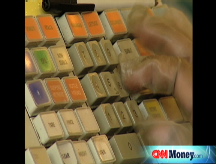Senate takes on oil, food speculators
Lawmakers examine a possible link between increased investment by Wall Street and rapidly rising commodity prices.
NEW YORK (CNNMoney.com) -- Speculation in the commodity markets took much of the blame for skyrocketing energy and food prices at a Senate hearing Tuesday
"This unbridled growth raises justifiable concerns that speculative demand - divorced from market realities - is driving food and energy price inflation, and causing a lot of human suffering," said Sen. Joseph Lieberman, I-Conn., chairman of the Homeland Security and Governmental Affairs committee that held the hearing.
With oil approaching $130 a barrel and a global food crisis looming, the panel heard testimony from experts about how speculative investment by institutional investors and hedge funds may be contributing to food and energy price inflation.
"Index speculators' trading strategies amount to virtual hoarding via the commodities futures markets," Michael Masters, a former hedge fund trader, told the committee in prepared testimony.
"Institutional investors are buying up essential items that exist in limited quantities for the sole purpose of reaping speculative profits," he said.
As the nation's financial markets have struggled with housing and credit problems, big Wall Street funds looking for more reliable returns have increasingly shifted money from the stock market to the commodities futures markets, fueling dramatic spikes in the price of everything from a barrel of oil to a bushel of wheat.
These funds have been blamed for upsetting the balance of the commodities markets. Though speculators have always existed in the commodities trade, critics say the recent influx of speculative investment has caused the price of raw materials to become disconnected from the economic fundamentals of supply and demand.
Masters recommended that Congress move to close the "swaps loophole," which speculators use to roll over monthly futures contracts, allowing them to "effectively circumvent position limits," he said.
Additionally, Masters said existing regulations should be modified to prohibit pension funds - seeking investment growth they can't find in other markets - from speculative investment in commodities.
Other factors. But Jeffrey Harris, chief economist of the Commodity Futures Trading Commission (CFTC), blamed other factors for fueling the boom in commodities. He said prices are being supported by the weak dollar, strong demand from emerging economies, geo-political tensions, supply disruptions, unfavorable weather and increased production of ethanol.
"To date, the CFTC's economic analysis indicates that broad-based manipulative forces are not driving the recent higher futures in commodities across-the-board," Harris said.
Though Harris said the CFTC will continue to monitor the markets for signs of manipulation, he argues that the Commission's data shows that "price changes are largely unrelated to fund trading."
"The absence of a link between fund positions and price changes suggest that global market fundamentals...provide a better explanation for the recent price increases," Harris testified.
Dr. Benn Steil, the Council on Foreign Relations' director of international economics, said in written testimony that there is "no doubt" that the recent rise in commodities prices has "been accompanied by a corresponding rise in interest from institutional investors."
While agreeing with Harris that economic factors have contributed to the surge, "these fundamental factors, as important as they are, cannot explain the magnitude of price rises in recent years."
Policy recommendations. Steil also said a devalued dollar, which was due in part to the Federal Reserve's rate-cutting moves aimed at stimulating the economy, has been "inducing people to buy commodities as a substitute for currency."
He recommended that Congress should do its part to revive the credit markets, which would improve economic conditions overall, mitigate inflation and restore confidence in the dollar.
Tom Buis, president of the National Farmers Union, recommended that Congress consider "dipping into the Strategic Petroleum Reserve" to help farmers cope with high energy input costs.
But Lieberman said accessing the strategic petroleum reserves is not the solution to the nation's energy problems but "it is a form of temporary relief."
Instead, the Connecticut senator said index speculators are "partly responsible for hurting a lot of individuals and businesses."
"I think it's important to limit the options that people have to maximize their profits, because a lot of us end up paying through the nose," he added. ![]()



